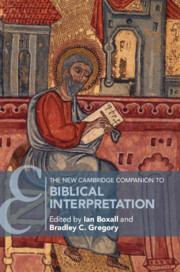Book contents
- The New Cambridge Companion to Biblical Interpretation
- Cambridge Companions to Religion
- The New Cambridge Companion to Biblical Interpretation
- Copyright page
- Contents
- Figures
- Contributors
- Acknowledgments
- Abbreviations
- Introduction
- Part I Methods
- Part II Frameworks/Stances
- Part III Reception
- 15 The Relevance of Textual Criticism for Biblical Interpretation
- 16 Premodern Interpretation and Contemporary Exegesis
- 17 The Bible and Literature
- 18 The Bible and Visual Exegesis
- 19 Uses of the Bible in Communities of Faith
- Scripture Index
- General Index
- Cambridge Companions to Religion
- References
16 - Premodern Interpretation and Contemporary Exegesis
from Part III - Reception
Published online by Cambridge University Press: 15 October 2022
- The New Cambridge Companion to Biblical Interpretation
- Cambridge Companions to Religion
- The New Cambridge Companion to Biblical Interpretation
- Copyright page
- Contents
- Figures
- Contributors
- Acknowledgments
- Abbreviations
- Introduction
- Part I Methods
- Part II Frameworks/Stances
- Part III Reception
- 15 The Relevance of Textual Criticism for Biblical Interpretation
- 16 Premodern Interpretation and Contemporary Exegesis
- 17 The Bible and Literature
- 18 The Bible and Visual Exegesis
- 19 Uses of the Bible in Communities of Faith
- Scripture Index
- General Index
- Cambridge Companions to Religion
- References
Summary
This chapter explores the ways in which the relationship between contemporary exegesis and the history of interpretation has been changing, to admit greater influence from premodern practice than was often allowed during modern times. Premodern interpretation is considered with examples from Augustine and Hugh of St, Victor, and then contemporary examples of reading the parable of the Good Samaritan and Psalm 137 are discussed to sample the issues.
- Type
- Chapter
- Information
- The New Cambridge Companion to Biblical Interpretation , pp. 301 - 317Publisher: Cambridge University PressPrint publication year: 2022

